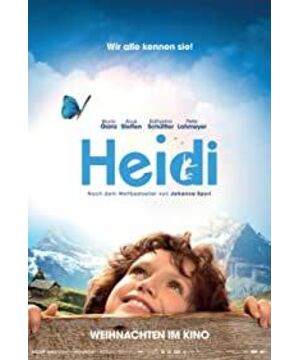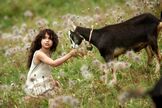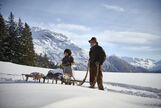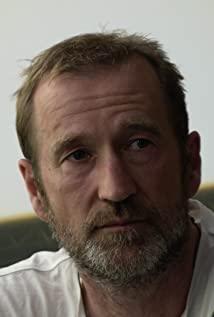When Heidi came here, Grandpa lived alone, in a simple wooden house, and was reticent. No one wants to try to get close to him.
"He's an atheist, he hates everyone. They say he forgot how to talk," the kind villager at the foot of the mountain told his aunt who brought Heidi.
After Heidi's parents died, her aunt took care of Heidi. In order to go out to work, she sent Heidi to Uncle Al who lived in the mountains.
From the comments of the villagers at the foot of the mountain, we know that he should be a weirdo.
"Even quarreled with his son."
In everyone's eyes, Uncle Al, who lost his son in old age, is not only lonely but also withdrawn.
So what did little Heidi see?
Grandpa lives on a picturesque mountain. He has two quaint and quiet wooden houses. He chops firewood and makes simple furniture by himself. Clear water flows happily beside the wooden houses...
The cheerful music and bright colors in the film are all expressing Heidi's mood when she first came.
The sun shines on the snow-like clouds, and the eagle hovers over the Alps against the blue sky and white clouds, making a free cry. Above the cloudy sky are birds, below the cloudy sky are the deep mountains, at the foot of the mountain is a mirror-like lake, and beside the lake are continuous wild flowers and knee-high weeds.
The chaotic clouds are flying across, the flowing water is gurgling, "the flowers come to the mountains, the shadows are like ponds", the Alps are as pure as the smile of a girl Heidi...
Grandpa gave this body to the mountains.
Just as Mu Xin once said: "Whoever wears the flower dresses whoever wears it, that person has the wind spirit in the hills and valleys of that person, just like clothes have the temperament of a raider."
In Heidi's eyes, grandpa's temperament should be harmonious Everything around was the same, simple and free, although at first he didn't welcome Heidi's arrival. This is the bad temper of people who have been used to freedom for a long time.
//
Heidi's arrival makes Grandpa resist like a hedgehog. He told her to "go away" and slammed the door to show his attitude.
Heidi had no choice but to open the door of Grandpa's sheepfold and live with the sheep.
The next morning, Grandpa handed Heidi the first bowl of goat milk that he squeezed.
But Grandpa still wanted to send Heidi to the pastor, find her a job or find someone to send her away. The priest told Grandpa that he was going to live with her until he was found.
Heidi heard some rumors in the mouth of Shepherd Pete, so there was such a dialogue.
Did Pete say something about me and you just believed him?
Is what he said true?
People gossip all the time, and you have to decide whether to trust your eyes and ears or what other people say.
The "related thing" in the dialogue refers to murder.
Do you trust your ears or listen to your heart? After Heidi met her grandfather, she saw her fierce grandfather, but the truth was not necessarily the case. Now someone said he killed someone, and she heard it.
This is what we often encounter in life. At the intersection of life, there are always people who come out to tell you how to go, others' words are experiences but also prejudices.
In the winter after the snow, Grandpa rode a sleigh and took Heidi down the mountain to find Pete. Heidi saw that Pete's grandma couldn't see the outside world and couldn't eat hard food.
Then he said to his grandfather: So, we are lucky, aren't we?
Heidi has experienced a series of life changes since she was a child, but she has always kept a pure heart, as free of impurities as the water flowing in the Alps.
The ice cube in Grandpa's heart was slowly melted, and the hearts of the two began to get closer.
The Alps in the movie Heidi and Granny represent the purest part of human nature.
Pure, kind, sincere, brave Heidi is like nature, like the Alps.
Her life here reminds me of American writer Barbara A quote from Kim Sowo: "You should be like a bird flying to your mountain." Yes, Heidi's life with Grandpa is like a bird flying to its mountain - free and happy.
//
"Children on the hill don't have to read," says Shepherd Pete.
The villagers at the foot of the mountain have lived here for generations. They work hard, but seldom read and have no ability to accept things beyond the scope of their cognition. So, they cling to hearsay and preconceptions.
Life was hard enough, and change required hard work. They would rather not take this risk. This can be seen from their attitude towards Uncle Al.
Those clinging to the secular, like the prison in the movie "The Shawshank Redemption", you may want to get rid of it at first, and when you find that you are unable to change, you may adapt to it, and even rely on it.
So, they keep closing themselves off, willing to be the one whose mind is rigid.
In the most beautiful natural scenery, ignorant souls will also grow.
At this time, Heidi only realized that there are the most beautiful natural scenery in the deep mountains, but did not realize that there are the most beautiful thought scenery in books. Thus, the second image book in the film appeared in due course.
If the Alps represent simplicity and freedom, then books represent richness and depth.
But Heidi's reading trip was due to a business.
In order to earn a reward, my aunt went back to the mountains, coaxed Heidi away, and took him to Frankfurt, which was full of traffic.
The mountains are quiet, simple, backward and sincere, and the city is noisy, turbulent, and developed.
Heidi was taken to an educated upper-class family in the city. Here, she became a companion to the rich lady Clara.
Clara has been ill since the death of her mother and has been unable to stand and walk since, and spends her life in a wheelchair. Clara, whose father is away for a long time, lives only as a servant and a housekeeper, and is often unhappy.
The arrival of Heidi brought some vitality back to her.
The grandma who came to visit Clara learned that Heidi did not like to read and tried to tell her stories. When Heidi showed a strong interest in stories, grandma told her that if you want to know the ending of the story, you must learn to read .
So, Heidi began to learn to read.
However, the repressed life here and the longing for her grandfather quickly made Heidi lose her vitality. She wanted to go back to her grandfather and go back to the mountains.
//
Heidi is lucky in the eyes of many. In Pete's words, "I heard you lived in a palace." However, Heidi did not like city life.
The rigid way of eating and various rules made her feel suffocated. She could not take food and talk to the servants at will; the windows were closed, and the buildings outside the windows were the same; the dogmatic teaching made her not interested at all; She couldn't feel the breath of sunlight and the breeze, let
alone the mountains and blue sky... Little Heidi took the wood carving that grandpa made for him, and missed the days with grandpa. For her, the meaning of life is not a splendid big house, nor elegant and standardized dining etiquette, but the sky and flying birds.
Even though Clara was reluctant, Heidi returned to the Alps and returned to her grandfather...
At Heidi's invitation, grandma took Clara to the mountains as a guest.
In the Alps, Clara saw a completely different scene from the city.
With Heidi's encouragement, Clara threw away the damn red tape, gulps goat milk like Heidi, licked the remaining goat milk at the bottom of the bowl with her tongue, and went up the mountain to grazing and picking flowers with Heidi, enjoying the sun without any worries. The caresses and the kisses of butterflies...
When Clara's father came to the mountain, cursing and disgusting this broken place, his daughter miraculously stood in front of him.
Clara's grandmother brought Heidi a wordless book, and her grandmother hoped that Heidi would complete the story herself, and Heidi hesitated.
"Everyone laughed at me because I wanted to write stories".
"That's because people know so little, and you've seen the bigger world. If you think there's something in this world that will make you happy, just do it, no matter what others say."
Grandma told her that if you want to do something, stick to it and don't give up because of what other people think.
Think of another children's movie "Butterfly", there is such a dialogue, between the girl Lisa and grandpa Julian.
Lisa: What is rich?
Julian: Being rich is doing what you love.
Fortunately, Heidi found it. That's where one person is different from another, one's wealth.
The famous German sociologist Max Weber said: "We are animals hanging on the web of meaning we weave". It is rare for a person to be able to weave his own web of meaning, instead of being a prisoner of foreign things for the sake of a big house, wearing beautiful clothes, and driving a good car, so that he can fly like a bird to his own mountain.
View more about Heidi reviews










